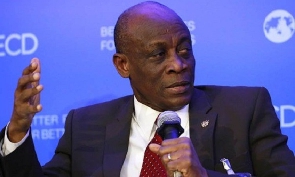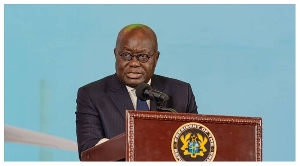General News of Monday, 9 March 2020
Source: myxyzonline.com
‘Don’t blame NDC for banking sector crisis’ – Seth Terkper
Former Finance Minister Seth Terkper has discounted claims that the previous government’s negligence led to the collapse of many banks in the country.
Mr Terkper in an interview with Kwame Minkah on Power 97.9 FM revealed that the National Democratic Congress (NDC) government made lots of sacrifices to save most banks from collapsing, including the then Ghana Commercial Bank.
Since 2017, the Central Bank has revoked the licences of 9 universal banks, 347 microfinance companies, 39 microcredit companies, 15 savings and loans companies, 8 finance house companies, and 2 non-bank institutions.
Notable among the banks were UniBank, Beige, Heritage, Capital, UT and GN Banks.
The regulator said the said financial institutions were undercapitalised hence the revocation of their licenses after they were given grace period. The BoG added its approach was to protect the interest of depositors in accordance with Sections 123 to 137 of Act 930.
There has been a nationwide debate over the approach used by the central bank in its clean–up exercise. While some believe that BOG is being inhuman by not applying the human face to the exercise, others are of the view that the approach was a necessary evil, blaming the previous government for negligence.
But Mr Terkper believes the approach by the ruling New Patriotic Party (NPP) government to collapse most of the banks was problematic therefore he cannot be blamed for the financial mess that has shaken the foundation of the banking industry and has caused thousands of job losses.
“We changed the Banking ACT…What we need now is to strengthen what we call the bank resolution so that when a bank is failing you’ll be able to [save it],” Mr Terkper said while arguing that the banks could have been saved through the Non-Performing Assets Recovery Trust (NPART) which was set up under the Financial Sector Adjustment Programme (FINSAP) as a vehicle to acquire the non-performing loans of distressed banks.
“…For me, the point is what’s our strategy? And we’re going to have a strategy just as we had a strategy for our debts…Well, if you expect banks to re-capitalize because the economy is going up and down why don’t you do that incrementally so that every year they can be putting in some money, you know in re-capitalizing?” the former minister quizzed as he bemoaned the NPP government’s strategy.
Mr Terkper further explained that their administration put in stringent measures that sustained some banks and strengthened the GCB Bank to be able to acquire the defunct Capital Bank.
“There were a lot of sacrifices that were made. We [NDC] stopped taking money from Ghana Commercial Bank and that’s why Ghana Commercial Bank was strong enough to absorb Capital Bank and other banks,” he added.
Throwing more light on the strategy the Mahama administration adopted to save the ailing banks, Mr Terkper disclosed that the introduction of Energy Sector Levy Act (ESLA) saved some of the banks from collapsing since it was used to defray some debts energy producers owed the banks.
“The first flow of ESLA by March 2016 was about 300 million cedis. With the 300 million, we [the NDC government] paid the banks that VRA, GRiDCO and others were owing,” he revealed.
Minority
It will be recalled that the Minority last year criticised the Akufo-Addo government for the banking sector clean-up and argued it could have spent less than the almost GHS 23 billion it used for the clean-up on saving jobs instead of closing down financial institutions.
MP for Bolgatanga Central and member of Parliament’s Finance Committee, Isaac Adongo, at a press conference indicated the NPP government could have followed plans the Mahama administration put in place to save the sector.
“The Ghanaian taxpayer would have been spared the high cost of this chaotic reform with Bank of Ghana if the Bank of Ghana had listened and followed the reform programme initiated by the NDC,”he said.
He put the blamed at the financial struggles on BoG Governor, Dr Ernest Addison and described him as “needless talkative who caused panic and crass confidence in the financial sector”.
Mr. Adongo also chastised the government for failing to settle its debt owed road contractors.
“Why would the government be ready to borrow GHC14 billion to close down banks and a further GHC7 billion to close down savings and loans companies as well as GHC2 billion to shut down microfinance companies but was not ready to use a fraction of this amount to pay government’s debt to contractors which largely accounted for the slide into insolvency of several cases of the collapsed banks?”











